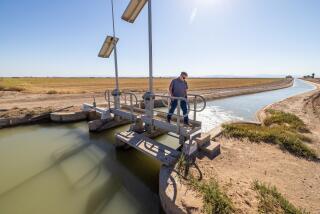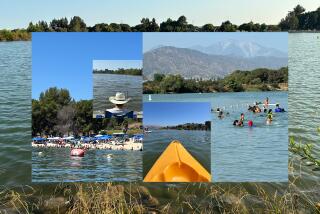Plan Calls for Refilling of Mono Lake : Resources: State agency’s proposal would assure permanent protection of environmental features but cut off traditional source of up to 15% of L.A.’s water.
- Share via
Agreeing that decades of water diversions by the city of Los Angeles have caused “extensive environmental damage,” a state agency on Tuesday released details of a proposed order that would permanently protect Mono Lake and its four alpine streams.
The requirements, if adopted by the State Water Resources Control Board next week, would restore the scenic Eastern Sierra lake to a greater depth by reducing the amount of fresh water that could be shipped south to Los Angeles. The proposed order is designed to resolve a 15-year-old dispute between environmentalists striving to protect the brine lake’s wildlife and the city 300 miles away defending its long-held water rights.
“The city of Los Angeles’ water diversions from the Mono Basin were authorized over 50 years ago when protection of environmental and public trust resources was viewed very differently than today,” the staff of the water board concluded in its report. “Los Angeles’ export of water from the Mono Basin has provided a large amount of high-quality water for municipal uses, but it has also caused extensive environmental damage.”
The recommendations were welcomed by environmentalists and fishing groups, although they had not yet studied the details.
“Obviously I feel another sense of relief, because now instead of on the one-yard line, we’re on the half-yard line,” said Jim Edmondson, regional director of CalTrout, one of the groups that sued the city to stop the water diversions. “We’re getting closer to that fateful day, when hopefully the final decision takes place that closes this entire matter. This has been such a litigious and laborious process.”
Officials at the Los Angeles Department of Water and Power, while long anticipating the proposal, were disheartened because it means a source that supplies up to 15% of the city’s water would be virtually off limits.
On Friday, a long-awaited environmental impact report recommended that the lake be allowed to fill to a higher water level, and Tuesday’s report by the state water agency reaffirmed that conclusion and forwarded a detailed order to the board, which will vote Sept. 28.
The agency staff recommends permanently raising Mono Lake to an average elevation of 6,392 feet above sea level--17 feet higher than its level today. The 6,392-foot option is what environmentalists have long advocated, while Los Angeles wanted it set 15 feet lower.
Under the proposal, the city could gradually resume taking small amounts--4,500 acre-feet a year, less than 5% of what it once took--when the lake’s level rises at least two feet above current levels. If the level rises an additional three feet, Los Angeles could increase its diversions to 16,000 acre-feet, or about 16% of its past flow.
The staff’s order also would require the city to “expeditiously” develop plans for restoring stream and waterfowl habitat in Lee Vining Creek, Walker Creek, Parker Creek and Rush Creek, freshwater streams that flow out of the Sierra Nevada and feed Mono Lake. The order sets specific amounts of water that must flow through the four streams during wet years and dry years.
Officials with the state agency say it will take 20 years for enough snow to melt off the eastern slopes of the Sierra Nevada to reach the lake’s recommended elevation. City officials say that if drought persists, it could take 30 years.
Losing the Mono Basin as a water source would be a major financial blow to Los Angeles, which has to spend about $38 million a year to replace the lost supply through purchases from the Metropolitan Water District, city officials said. The water district gets its water from Northern California’s Sacramento-San Joaquin River Delta and from the Colorado River.
The city has pumped no water from the Mono Basin since 1989 after losing various court battles with environmental groups. The California Supreme Court ruled in 1983 that the state water board must re-evaluate and set new permanent water rights for the city to comply with environmental standards.
The staff concluded in its report that “there are other sources of water reasonably available to Los Angeles” so the water restrictions are feasible.
Gov. Pete Wilson, in a statement, called Mono Lake “a national treasure” and said, “California must look to creative conservation and reclamation programs to meet our growing water needs.”
Wilson on Monday signed a state Assembly bill that approved $36 million over the next four years for water projects in Los Angeles, mostly for the East Valley Reclamation Project in the San Fernando Valley. That project would supply enough to compensate for about one-third of the lost 95,000 acre-feet.
Home to millions of migratory birds as well as rare brine shrimp and alkali flies, Mono Lake is the remnant of a vast inland sea where fresh alpine runoff combines with salty water. Its unique ecosystem is believed to be over a million years old.
More to Read
Sign up for Essential California
The most important California stories and recommendations in your inbox every morning.
You may occasionally receive promotional content from the Los Angeles Times.













